新人教版八年级英语上Unit 1 Where did you go on vacation 教学笔记
新2024秋季八年级英语上册人教版Unit1Wheredidyougoonvacation?听课记录

新2024秋季八年级人教版英语上册Unit 1 Where did you go on vacation? 听课记录一、教学目标(核心素养)•语言能力:学生能够流利地使用一般过去时描述自己的假期经历,包括地点、活动和感受。
•思维品质:通过对比不同学生的假期经历,培养学生的批判性思维和创新能力。
•文化意识:增进对不同旅游文化的了解,培养学生的跨文化交流能力。
•学习能力:通过合作学习,提高学生自主学习和解决问题的能力。
二、导入教师行为:•教师展示一系列关于世界各地风景名胜的图片,每张图片都配以简短的英文描述。
•提问:“Which place do you like best? Why? Have you ever been there or dream of going there?” 引导学生分享自己的喜好和旅行愿望。
•引出话题:“Many of us have wonderful memories of our vacations.Today, let's share our stories and learn about others' experiences.”学生活动:•学生认真观看图片,积极思考并回答教师的问题。
•部分学生分享了自己的旅行经历或梦想中的旅行目的地,激发了课堂气氛。
过程点评:•图片导入直观生动,有效激发了学生的学习兴趣和参与度。
•通过分享个人经历,学生自然地进入了学习状态,为后续的学习活动做了良好的铺垫。
三、教学过程(一)词汇预热教师行为:•在黑板上列出与假期旅行相关的词汇,如“vacation”, “beach”, “mountain”,“visit”, “enjoy”等,并领读几遍。
•通过快速问答的方式,检查学生对这些词汇的理解和掌握情况。
学生活动:•学生跟读词汇,并尝试在脑海中构建与这些词汇相关的场景。
•积极参与快速问答,展示自己的词汇掌握情况。
过程点评:•词汇预热为后续的阅读和写作活动打下了坚实的基础。
人教版英语八年级上册 Unit 1 Where did you go on vacati

go out 出去
last month 上个月
take photos 拍照
quite a few 相当多;不少
have a good time 玩得开心 go shopping 去购物
of course 当然;自然
seem to do sth. 似乎做某事;好像做某事
keep a diary 写日记
Unit 1 Where did you go on vacation?
单元知识盘点
常用短语
on vacation 度假
go to the mountains 去爬山
stay at home 待在家里 go to the beach 去海滩
summer camp 夏令营
play volleyball 打排球
经典句型
1. ...I bought something for my father. ……我给我爸爸买了一些 东西。
2. Everything tasted really good! 所有的食物尝起来都很美味! 3. How did you like it? 你认为它(三亚)怎么样? 4. It was sunny and hot, so we decided to go to the beach near our
5. |烟台中考|—Look at my new smartphone.
—Wow, it’s so cool. When and where C you
it?
A. do; buy
B. have; bought
C. did; buy
D. have; had
6. —I have seen The Adventures of Alice in Wonderland. What
八年级上新人教版Unit1 Where did you go on vacation

八年级上新人教版Unit1 Where did you go on vacation?语言讲解1.Why not +动原+其它?=Why don’t you +动原+其它?为什么不干某事?,Why don’t you play ?=Why not play?, Why didn’t you buy anything for yourself?2.(1)反身代词:myself, yourself, himself, herself, itself, ourselves, yourselves, themselves.(2) by+主语的反身代词,“单独地,独自地”;(3)Why not +动原+其它?=Why don’t you +动原+其它?为什么不干某事?,Why don’t you play ?=Why not play?, Why didn’t you buy anything for yourself? (4)特殊疑问词、不定代词和不可数名词作句子主语,谓语动词按三单。
Everything was excellent.(5) nothing =not anything,(6)keep a diary记日记,3.(1) 不定代词和不定副词定语后放。
不定代词有: something, anything, nothing, everything, someone, anyone, no one, everyone, somebody, anybody, nobody, everybody. 不定副词有: somewhere, anywhere, nowhere, everywhere. 如,something delicious, anything special, Did you go anywhere interesting ?(2)little +不可数,“没一点儿”,a little +不可数,“有一点儿“,few +复数,“没几个”,a few +复数,“有几个”,4.(1)wonder+从句, 从句=引导词+主语+谓语; I wonder what life was like here in the past.(2)because+从句, because of+短语, (3) too many+复数, “太多”; too much+不可数, “太多”; much too+形=too +形,“太”,5.(1) quite a few+复数,”很多”, (2) What about doing…? =How about doing…?干某事怎么样? (3)stay at home to do sth.呆在家干某事. (4)most of time大多数时间,。
人教新目标版英语八上unit 1《Where did you go on vacation》教学设计

人教新目标版英语八上unit 1《Where did you go on vacation》教学设计一. 教材分析人教新目标版英语八上Unit 1《Where did you go on vacation》主要讲述了人们度假的地方和度假活动。
本节课主要让学生掌握一般过去时的疑问句和回答,以及如何描述他们过去的假期。
教材通过丰富的图片和情景对话,激发学生的学习兴趣,培养学生用英语进行交流的能力。
二. 学情分析学生在学习本节课之前,已经掌握了一般现在时和一般过去时的基本知识,能够用英语进行简单的日常交流。
但部分学生对一般过去时的疑问句和回答还不够熟练,需要老师在教学中给予重点辅导。
此外,学生对度假地的名称和活动还比较陌生,需要老师通过图片和例句进行引导。
三. 教学目标1.知识目标:让学生掌握一般过去时的疑问句和回答,能够用英语描述自己和他人的假期经历。
2.能力目标:培养学生用英语进行询问和描述假期经历的能力,提高学生的口语交流能力。
3.情感目标:通过本节课的学习,让学生对不同的度假地和文化产生兴趣,拓宽视野。
四. 教学重难点1.重点:一般过去时的疑问句和回答。
2.难点:如何用英语描述自己和他人的假期经历。
五. 教学方法1.情境教学法:通过图片和情景对话,让学生在实际情境中学会一般过去时的疑问句和回答。
2.任务型教学法:通过小组讨论和角色扮演,让学生在完成任务的过程中,学会用英语描述假期经历。
3.交际法:鼓励学生在课堂上用英语进行交流,提高口语表达能力。
六. 教学准备1.图片:准备一些度假地的图片,如海滩、山区、城市等。
2.角色扮演卡:制作一些角色扮演的卡片,包括不同的人物和假期活动。
3.课件:制作本节课的课件,包括单词、短语和对话。
七. 教学过程1.导入(5分钟)a.老师向学生问好,并询问他们上周做了什么。
b.学生回答后,老师引导他们用英语表达:“I went to…”来描述自己的活动。
c.老师通过展示度假地的图片,引导学生谈论自己喜欢的度假地。
人教版英语八年级上第一单元Unit1Wheredidyougoonvacation知识点梳理

人教版英语八年级上第一单元Unit1Wheredidyougoonvacation知识点梳理Unit 1 Where did you go on vacation?知识梳理一、词型转换Section A1.wonder →(adj.) wonderful2.I →(反身代词) myself3.you →(反身代词) yourself4.yourself →(pl.) yourselves5.seem →(pt.) seemedSection B1.activity →(pl.) activities2.decide →(n.) decision3.try →(pt.) tried4.bike →(同义词) bicycle5.build →(n.) building6.difference →(adj.) different7.like →(反义词) dislike8.below →(反义词) above二、短语归纳Section A1.go to Central Park 去中央公园2.on vacation 在度假3.buy something special 买特别的东西4.meet someone interesing 遇见有趣的人5.go out with someone 和某人一起出去6.take quite a few photos 拍相当多的照片7.most of the time 大多数时间8.go shopping 去购物9.keep a diary 记日记10.of course 当然;自然Section B1.have a good time 玩得高兴;过得愉快2.go to the beach 去海滩3.feel like 感觉像4.the houses of the Chinese traders 中国商人的房子5. a lot of new buildings 许多新的建筑物6.in the past 在过去7.over an hour 一个多小时8.too many people 太多的人9.get to the top 到达顶部10.because of the bad weather 因为不好的天气11.one bowl of fish 一碗鱼肉12.another two hours 另外两个小时13.the top of the hill 山顶14.learn something important 学习重要的东西Self Check1.go to the countryside 去乡下2.in the shopping center 在购物中心3.have a fun time 玩得高兴;过得愉快4.after three hours 三个小时以后5.keep going 一直走6.twenty minutes later 20分钟后重点句子1.Where did you go on vacation?你去哪儿度假的?2.Long time no see.好久不见。
人教版英语八上Unit 1 Where did you go on vacation知识点短语归纳

Unit 1 Where did you go on vacation?visit sb.拜访某人;看望某人go on vacation=have/take a vacation去度假long time no see好久不见visit someplace参观某地stay at home待在家里go out出去taste good尝起来很好吃one bowl of… 一碗……go to summer camp去参观夏令营visit museums 参观博物馆study for为……而学习quite a few/a little/a lot相当多;不少most of the time大部分时间of course当然;自然keep a diary记日记have a good time=have fun=enjoy oneself玩得高兴;过得愉快feel like给……的感觉;想要because of因为drink tea喝茶take photos照相goshopping/fishing/camping/skating/boating/hiking/swi-mming去购物/钓鱼/野营/滑冰/划船/远足/游泳in the past在过去the next day第二天walk around到处走走walk up to步行到……find out找出;查明go on继续下去;(时间)流逝take photos照相something important重要的事up and down来来回回up升起on加油;过来;得了吧come out出来in进来true实现nothing…but…除了……之外什么也没有a little一点儿too manymuch太多in excitement激动地m ost 大部分many of 许多much 一些some 一些wait for等待bring back… from…从……带回……along the way沿途,一路上taste+adj.尝起来……arrive in+大地点arrive at+小地点look+adj. 看起来……buy sth.for sb.给某人买某物sb.sth.给某人买某物want 想要某人(不)做某事tell sb.(not)to do sth. 告诉某人(不)做某事ask要求某人(不)做某事start to do开始做某事doing开始做某事forget to do sth.忘记去做某事doing sth.忘记做过某事try doing sth.试着做某事to do sth.尽力做某事stop to do停下来做某事doing停下正在做的事stop停止做某事dislike doing sth. 不喜欢做某事enjoy 喜欢做某事keep 继续/重复做某事so+adj./adw.+that从句如此……以至于………Why not do...?=why don’t we do...?为什么不做……?How do you like...?=How do you feel about...?=What do you think of...?你认为……怎么样?Nothing much to do but do...除了...之外没事可做seem to be+adj.似乎……;好像……decide to do sth.决定做某事。
(完整版)新人教版八年级英语上册unit1知识点总结

Unit 1 where did you go on vacation ➢单词复习:任何人Anywhere 精彩的;极好的最多的;大多数的没有什么n.没有。
每人;人人.我自己你自己;你亲自hen pig似乎;好像无聊的;厌烦的;郁闷的Someone Diary 活动;活跃。
决定;选定Paragliding bird bicycle building trader惊奇;想知道;怀疑差异;不同顶部;顶等;等待湿的;雨天的低于;在。
..下面饥饿的;渴望的如同;像.。
一样HillDuck不喜欢;厌恶短语归纳1、go on vacation去度假 ,2、stay at home 呆在家,3、go to the mountains 上山/进山,4、go to the beach到海边去,5、visit museums 参观博物馆,6、go to summer camp 去夏令营,7、quite a few 相当多,8、study for为……学习,9、go out 出去,10、most of the time 大部分时间/绝大多数时间,11、taste good 尝起来味道好,12、have a good time玩的开心,13、of course当然可以,14、feel like(doing sth)感觉像……/想要,15、go shopping购物,16、in the past 在过去,17、walk around绕……走,18、too many 太多(可数名词前面),19、because of 因为,20、one bowl of 一碗……,21、find out 查出来/发现,22、go on继续,23、take photos 照相,24、something important重要的事情,25、up and down上上下下,26、come up出来➢习惯用法、搭配1. buy sth。
for sb.=buy sb. sth。
人教新目标八年级英语上册Unit1Wheredidyougoonvacation知识点讲解
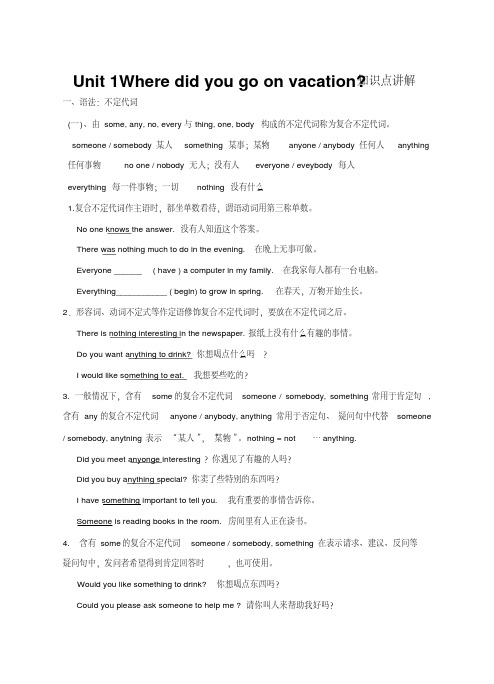
Unit 1Where did you go on vacation?知识点讲解一、语法:不定代词(一)、由some, any, no, every与thing, one, body 构成的不定代词称为复合不定代词。
someone / somebody 某人something 某事;某物anyone / anybody 任何人anything 任何事物no one / nobody 无人;没有人everyone / eveybody 每人everything 每一件事物;一切nothing 没有什么1.复合不定代词作主语时,都坐单数看待,谓语动词用第三称单数。
No one knows the answer. 没有人知道这个答案。
There was nothing much to do in the evening. 在晚上无事可做。
Everyone ______ ( have ) a computer in my family. 在我家每人都有一台电脑。
Everything___________ ( begin) to grow in spring. 在春天,万物开始生长。
2.形容词、动词不定式等作定语修饰复合不定代词时,要放在不定代词之后。
There is nothing interesting in the newspaper.报纸上没有什么有趣的事情。
Do you want anything to drink?你想喝点什么吗?I would like something to eat. 我想要些吃的?3. 一般情况下,含有some的复合不定代词someone / somebody, something常用于肯定句,含有any的复合不定代词anyone / anybody, anything常用于否定句、疑问句中代替someone / somebody, anytning表示“ 某人”,“某物”。
人教新目标版英语八上Unit1《Wheredidyougoonvacation》精美说课稿
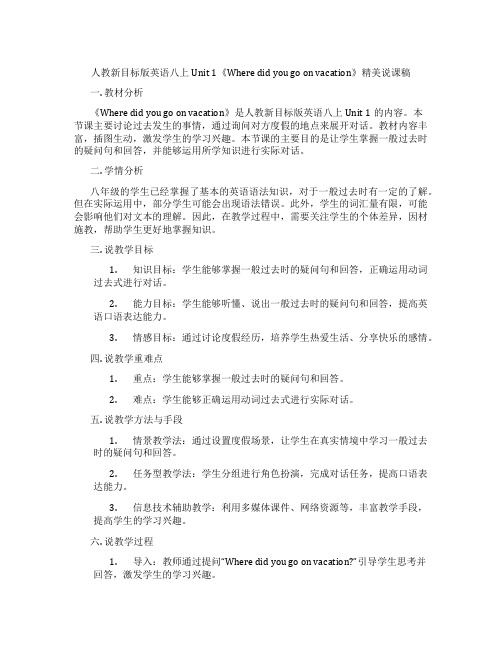
人教新目标版英语八上Unit 1《Where did you go on vacation》精美说课稿一. 教材分析《Where did you go on vacation》是人教新目标版英语八上Unit 1的内容。
本节课主要讨论过去发生的事情,通过询问对方度假的地点来展开对话。
教材内容丰富,插图生动,激发学生的学习兴趣。
本节课的主要目的是让学生掌握一般过去时的疑问句和回答,并能够运用所学知识进行实际对话。
二. 学情分析八年级的学生已经掌握了基本的英语语法知识,对于一般过去时有一定的了解。
但在实际运用中,部分学生可能会出现语法错误。
此外,学生的词汇量有限,可能会影响他们对文本的理解。
因此,在教学过程中,需要关注学生的个体差异,因材施教,帮助学生更好地掌握知识。
三. 说教学目标1.知识目标:学生能够掌握一般过去时的疑问句和回答,正确运用动词过去式进行对话。
2.能力目标:学生能够听懂、说出一般过去时的疑问句和回答,提高英语口语表达能力。
3.情感目标:通过讨论度假经历,培养学生热爱生活、分享快乐的感情。
四. 说教学重难点1.重点:学生能够掌握一般过去时的疑问句和回答。
2.难点:学生能够正确运用动词过去式进行实际对话。
五. 说教学方法与手段1.情景教学法:通过设置度假场景,让学生在真实情境中学习一般过去时的疑问句和回答。
2.任务型教学法:学生分组进行角色扮演,完成对话任务,提高口语表达能力。
3.信息技术辅助教学:利用多媒体课件、网络资源等,丰富教学手段,提高学生的学习兴趣。
六. 说教学过程1.导入:教师通过提问“Where did you go on vacation?”引导学生思考并回答,激发学生的学习兴趣。
2.新课呈现:教师展示教材插图,介绍一般过去时的疑问句和回答。
3.课堂活动:学生分组进行角色扮演,完成对话任务,教师巡回指导。
4.巩固练习:学生进行小组竞赛,看哪个小组能够在最短时间内完成一般过去时的疑问句和回答。
新人教版八年级英语上册复习短语笔记资料Unit 1 Where did you go on vacation
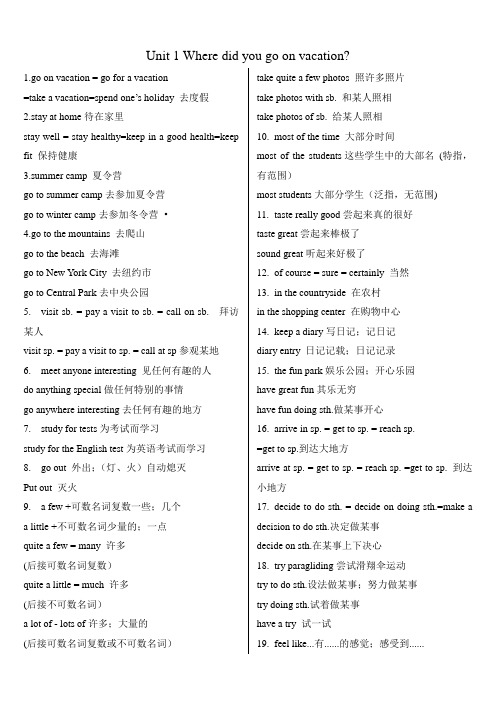
Unit 1 Where did you go on vacation?1.go on vacation = go for a vacation=take a vacation=spend one’s holiday 去度假2.stay at home待在家里stay well = stay healthy=keep in a good health=keep fit 保持健康3.summer camp 夏令营go to summer camp去参加夏令营go to winter camp去参加冬令营•4.go to the mountains 去爬山go to the beach 去海滩go to New York City 去纽约市go to Central Park去中央公园5. visit sb. = pay a visit to sb. = call on sb. 拜访某人visit sp. = pay a visit to sp. = call at sp参观某地6. meet anyone interesting 见任何有趣的人do anything special做任何特别的事情go anywhere interesting去任何有趣的地方7. study for tests为考试而学习study for the English test为英语考试而学习8. go out 外出;(灯、火)自动熄灭Put out 灭火9. a few +可数名词复数一些;几个a little +不可数名词少量的;一点quite a few = many 许多(后接可数名词复数)quite a little = much 许多(后接不可数名词)a lot of - lots of许多;大量的(后接可数名词复数或不可数名词)take quite a few photos 照许多照片take photos with sb. 和某人照相take photos of sb. 给某人照相10. most of the time 大部分时间most of the students这些学生中的大部名(特指,有范围)most students大部分学生(泛指,无范围)11. taste really good尝起来真的很好taste great尝起来棒极了sound great听起来好极了12. of course = sure = certainly 当然13. in the countryside 在农村in the shopping center 在购物中心14. keep a diary写日记;记日记diary entry 日记记载;日记记录15. the fun park娱乐公园;开心乐园have great fun其乐无穷have fun doing sth.做某事开心16. arrive in sp. = get to sp. = reach sp.=get to sp.到达大地方arrive at sp. = get to sp. = reach sp. =get to sp. 到达小地方17. decide to do sth. = decide on doing sth.=make a decision to do sth.决定做某事decide on sth.在某事上下决心18. try paragliding尝试滑翔伞运动try to do sth.设法做某事;努力做某事try doing sth.试着做某事have a try 试一试19. feel like...有......的感觉;感受到......20. have something very special 吃一些非常特别的东西ride bikes to Georgetown 骑自行车去乔治敦21. from 100 years ago 自一百年以前in the past在过去in the past few years在过去几年里22. enjoy doing sth.享受/喜欢做某事enjoy oneself = have a good time= have fun =have a fun time玩得开心;过得愉快23. make a difference=play an important role有影响;起(重要)作用24. walk up to..朝......走过去walk back home步行回家walk to school步行上学25. wait for…等待wait for sb. to do sth.等待某人去做某事26. rain hard = rain heavily 下大雨rain cats and dogs下倾盆大雨27. because of +名词/动名词因为......because +从句因为......28. another two hours = two more hours 再过两小时29. make notes=take notes做记录;做笔记30. each other互相(用于两者之间)one another互相(用于三者或三者以上)31. at the airport 在机场at the station 在车站32. on one’s way home在某人回家的路上on one ‘ s way to school在某人上学的路.33. bring back 带回来34. on our school trip 在我们学校郊游的旅途中go on a trip=travel to sp.去旅行35. find out查明;弄清楚36. keep doing sth.继续做某事;一直做某事不停地做某事;持续做某事37. go on继续往前走;继续;发生go on doing sth.继续做同一件事go on to do sth.继续做另一件事go on with sth.继续某事38. up and down上上下下;来回;到处;彻底地39. in excitement 兴奋地in surprise = surprise sb.=to one’s surprise惊讶地40. come up上升,升起;靠近,走近;长出41. forget about sth.忘了某事forget to do sth.忘记去做某事forget doing sth.忘记做过某事。
最新人教版英语八年级上册Unit1-Where-did-you-go-on-vacation

A: Grace, where did you go on vacation? B: I went to New York City. A: Oh, really? Did you go with anyone? B: Yes, I went with my mother.
stop trip
Test --in --class
1.Tom ____(stay) at home last year. 2.Did you ___ (go) to the beach yesterday? 3.Tom ___ (去爬山)with Jim last year. 4.I went to Beijing with my mom on vacation.(划线 提问) ___ ___ you ____ on vacation? 5.Sally went to New York yesterday.(变一般疑问句 并做否定回答) ___ Sally ___ to New York yesterday? ____,____ _____.
Where did they go on vacation?
Name
1. Tina
2. Xiang Hua 3. Sally 4. Bob 5. Tom
Activities
went to the mountains. went to New York City.
stayed at home.
visited his uncle.
3.—Where _______ you half an hour ago? —I ______ in the school library. A.are, am B. are, was C. were, was D. were, am
人教新目标八年级上册英语《Unit 1 Where did you go on vacation?》

人教新目标八年级上册英语《Unit 1 Where did you go on vacation?》Section B_教学设计1一. 教材分析人教新目标八年级上册英语《Unit 1 Where did you go on vacation?》Section B 主要讲述了假期旅行的主题。
通过本节课的学习,学生能够掌握一般过去时的疑问句和回答,以及如何描述过去发生的事情。
教材内容贴近学生的生活,激发学生对旅行的兴趣,提高学生的口头表达能力。
二. 学情分析八年级的学生已经掌握了基本的英语语法知识,具有一般现在时和一般过去时的基础。
在学习本节课之前,学生已经学习了如何用英语描述家庭成员和询问他们的去向。
因此,学生在学习本节课时,能够将已有的知识与新的知识相结合,提高学习效果。
三. 教学目标1.知识目标:–能够听懂、说出一般过去时的疑问句和回答。
–能够用英语描述过去发生的事情。
2.能力目标:–能够与他人用英语交流关于假期旅行的经历。
–能够提高口头表达能力。
3.情感目标:–激发学生对旅行的兴趣,拓宽视野。
–培养学生的团队协作精神。
四. 教学重难点•一般过去时的疑问句和回答。
•如何用英语描述过去发生的事情。
•一般过去时疑问句的构成和用法。
•如何在实际交流中运用一般过去时。
五. 教学方法1.情境教学法:通过设置旅行相关的情境,让学生在实际语境中学习英语。
2.交际法:鼓励学生参与课堂互动,提高学生的口头表达能力。
3.任务型教学法:通过小组合作完成任务,培养学生的团队协作精神。
六. 教学准备1.教学课件:制作与旅行相关的课件,包括图片、视频等。
2.教学道具:准备一些与旅行相关的实物道具,如地图、行李箱等。
3.小组活动准备:划分学习小组,提前分配任务。
七. 教学过程1.导入(5分钟)–教师展示一张旅行图片,引导学生谈论旅行的话题。
–学生分享自己最喜欢的旅行地点和经历。
2.呈现(10分钟)–教师通过课件呈现一般过去时的疑问句和回答。
新人教版八年级英语上册unit1 where did you go on vacation单元分析+教案

Unit1 Where did you go on vacation?单元分析一、教材分析Unit1 Where did you go on vacation?的核心话题为“Talking about holidays, vacations and past events”,主要描述有关假期等过去的事情,学习和运用一般过去时,使学生学会谈论和交流过去发生的事情,让学生在交际活动中学会如何正确用英语谈论自己及询问他人过去的事情与经历,重在培养学生的语言运用能力、实践能力、合作能力及创新意识。
二、教学目标1.知识目标:1) 掌握并能灵活运用本单元出现的重点词汇。
动词及它的过去式:stay(ed), visit(ed), go(went), do(did), is/am(was)2)用“Where did you go...? Did you...?”询问他人过去的经历。
3)掌握以下句式:(1)— Where did sb. go (on vacation)?—Sb.+ went to … (on vacation).(2)— What did sb. do (on vacation)?—Sb. +verb + ed … (on vacation).(3)一般过去时的应用。
2.能力目标:学会谈论发生在过去的事情;能听懂以谈论假期做过的事情和谈论过去的事件及自己的感想为话题的语言材料,并获取相关信息。
能以“Talking about holidays and vacations”,“Talking about past events”为话题与他人进行交流;能利用该话题进行情景对话及角色表演。
3.情感目标:本单元的教学内容与学生的实际生活息息相关,容易激发学生的兴趣,从而乐于运用简单的英语与他人进行交流。
学习活动中学生通过交换对过去发生的事情的描述及看法,从而促进学生之间和师生之间的情感交流,增进友谊。
三、重点和难点1. 一般过去时及其应用。
新人教版八年级英语上册全册单词表含音标
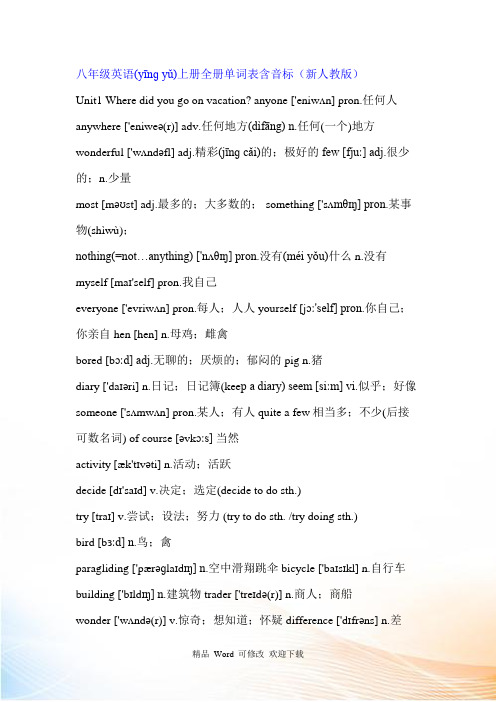
八年级英语(yīnɡ yǔ)上册全册单词表含音标(新人教版)Unit1 Where did you go on vacation? anyone ['eniwʌn] pron.任何人anywhere ['eniweə(r)] adv.任何地方(dìfāng) n.任何(一个)地方wonderful ['wʌndəfl] adj.精彩(jīnɡ cǎi)的;极好的few [fjuː] adj.很少的;n.少量most [məʊst] adj.最多的;大多数的; something ['sʌmθɪŋ] pron.某事物(shìwù);nothing(=not…anything) ['nʌθɪŋ] pron.没有(méi yǒu)什么n.没有myself [maɪ'self] pron.我自己everyone ['evriwʌn] pron.每人;人人 yourself [jɔː'self] pron.你自己;你亲自 hen [hen] n.母鸡;雌禽bored [bɔːd] adj.无聊的;厌烦的;郁闷的 pig n.猪diary ['daɪəri] n.日记;日记簿(kee p a diary) seem [siːm] vi.似乎;好像someone ['sʌmwʌn] pron.某人;有人 quite a few相当多;不少(后接可数名词) of course [əvkɔːs] 当然activity [æk'tɪvəti] n.活动;活跃decide [dɪ'saɪd] v.决定;选定(decide to do sth.)try [traɪ] v.尝试;设法;努力 (try to do sth. /try doing sth.)bird [bɜːd] n.鸟;禽paragliding ['pærəɡlaɪdɪŋ] n.空中滑翔跳伞 bicycle ['baɪsɪkl] n.自行车building ['bɪldɪŋ] n.建筑物 trader ['treɪdə(r)] n.商人;商船wonder ['wʌndə(r)] v.惊奇;想知道;怀疑 difference ['dɪfrəns] n.差异;不同 top [tɒp] n.顶部;顶wait [weɪt] v.等;等待(wait for) umbrella [ʌm'brelə] n.伞;雨伞 wet [wet] adj.湿的;雨天的below [bɪ'ləʊ] prep.低于;在...下面adv.在下面as [əz] conj.如同;像...一样enough [ɪ'nʌf] adj.足够的adv.足够地;充分地duck [dʌk] n.鸭肉;鸭hungry(反full) ['hʌŋɡri] adj.饥饿的;渴望的 feel like(doing sth.)想要dislike [dɪs'laɪk] v.不喜欢;厌恶 n.不喜爱;厌恶;反感because of因为;由于have a good time = enjoy oneself = have fun(doing sth.)玩得痛快Unit2 How often do you exercise?housework ['haʊswɜːk] n.家务劳动hardly ['hɑːdli] adv.几乎不;简直不;刚刚 ever ['evə(r)] adv.曾经;在任何时候 once [wʌns] adv.一次;曾经 twice [twaɪs] adv.两倍;两次Internet ['ɪntənet] n.因特网program ['prəʊɡræm] n.节目;程序;课程;节目单full [fʊl] adj.满的;充满的;完全的swing [swɪŋ] n.摇摆;秋千v.摇摆;旋转 maybe ['meɪbi] adv.或许;也许;可能 swing dance摇摆舞least [liːst] adj.最小的;最少的 at least至少hardly ever很少;几乎从不;难得 junk n.垃圾;废旧杂物coffee ['kɒfi] n.咖啡;咖啡色health [helθ] n.健康;人的身体或精神状态 result [rɪ'zʌlt] .结果;后果percent [pə'sent] adj.百分之...的online [ˌɒn'laɪn] adj.在线的adv.在线地television ['telɪvɪʒn] n.电视机;电视节目 although [ɔːl'ðəʊ] conj.虽然;尽管;然而;可是through [θruː] prep.穿过;凭借;一直到 body ['bɒdi] n.身体mind [maɪnd] .头脑;想法;意见;心思 such [sʌtʃ] adj.这样的;如此的 together [tə'ɡeðə(r)] adv.共同;一起 die [daɪ] v.死;枯竭;消失writer ['raɪtə(r)] n.作者;作家 dentist ['dentɪst] n.牙科医生 magazine ['mæɡəziːn] n.杂志 however [haʊ'evə(r)] adv.然而;无论如何;不管多么 than [ðən] conj.比almost ['ɔːlməʊst] adv.几乎;差不多none [nʌn] pron.没有人;没有任何东西,毫无less [les] adj.更少的;较少的point [pɔɪnt] n.看法;要点;重点;小数点;系;延伸;(伸手)去够heart [hɑːt] n.心脏;内心 fact [fækt] n.事实;真相;实际break [breɪk] v.打碎;折断;违背;解决;中断laugh [lɑːf] v.发笑;笑;嘲笑 n.笑声;笑;笑料目标;分数such as例如;诸如junk food n.垃圾食品;无营养食品 more than超过;多于;不仅仅;非常 less than不到;少于Unit3 I'm more outgoing than my sister.outgoing ['aʊtɡəʊɪŋ] adj.外向的better ['betə(r)] adj.更好的;较好的 adv.更好地loudly ['laʊdli] adv.大声地;高声地;花俏地 quietly ['kwaɪətli] adv.安静地;悄悄地;平静地hard-working [hɑːd'wɜːkɪŋ] adj.勤勉的;努力工作的 competition[ˌkɒmpə'tɪʃn] n.竞争;比赛 fantastic [fæn'tæstɪk] adj.极好的;了不起的 which adj.哪一个;哪一些pron.哪一个;哪些clearly ['klɪəli] adv.清楚地;显然地win [wɪn] v.赢;赢得;获胜;获得n.胜利 though conj.虽然;尽管;adv.不过 care about关心talented ['tæləntɪd] adj.有才能的;有天赋的truly ['truːli] adv.真实地;真诚地;正确地 care [keə(r)] v.关心;担忧;照顾;在乎 serious ['sɪəriəs] adj.严肃的;严重的;庄重的mirror ['mɪrə(r)] n.镜子;反映necessary ['nesəsəri] adj.必要的;必然的 both [bəʊθ] adj.两者都pron.两者should [ʃəd] aux.应该;可能;应当;将要 touch [tʌtʃ] vt.触摸;感动reach [riːtʃ] v.到达;伸出;达成;取得联similar ['sɪmələ(r)] adj.类似的share [ʃeə(r)] vt.分享,共享;分配;共有 loud [laʊd] adj.大声的;adv.大声地;响亮地 primary ['praɪməri] adj.最初的,最早的 be differentfrom和...不同information [ˌɪnfə'meɪʃn] n.信息;情报;资料;通知 as long as只要bring out拿出;推出 the same as与...同样的in fact事实上;实际上;确切地说 be similar to类似于;与...相似Unit4 What's the best movie theater? theater ['θɪətə] n.剧场;电影院;戏院comfortable ['kʌmftəbl] adj.舒适的;充裕的seat [siːt] n.座位;screen [skriːn] n.屏幕;银幕close [kləʊs] v.关;合拢;不开放;停业 worst [wɜːst] adj.最坏的;最差的 cheaply ['tʃiːpli] adv.廉价地;粗俗地 song [sɒŋ] n.歌曲;歌唱choose [tʃuːz] v.选择;决定carefully ['keəfəli] adv.小心地,认真地 reporter [rɪ'pɔːtə(r)] n.记者fresh [freʃ] adj.新鲜的;清新的comfortably ['kʌmftəbli] adv.舒服地;容易地;充裕地worse [wɜːs] adj.更坏的;更差的 service ['sɜːvɪs] n.服务pretty ['prɪti] adv.相当地adj.漂亮的menu ['menjuː] n.菜单 act [ækt] v.行动;表演meal [miːl] n.一餐;膳食 so far到目前为止;迄今为止no problem没什么;不客气creative [kri'eɪtɪv] adj.创造的,创造性的; performer [pə'fɔːmə(r)] n.表演者;执行者 talent ['tælənt] n.天赋(tiānfù);才能,才艺;common ['kɒmən] adj.常见(chánɡ jiàn)的;共同的;普通的magician [mə'dʒɪʃn] n.魔术师;术士(shù shì)beautifully ['bjuːtɪfli] adv.美丽地;完美(wánměi)地; action ['ækʃn] n.行为;活动cartoon [kɑː'tuːn] n.卡通;漫画 culture ['kʌltʃə(r)] n.栽培;文化;教养famous ['feɪməs] adj.著名(zhùmíng)的;有名的 appear [ə'pɪə(r)] vi.出现;出版;显得 become [bɪ'kʌm] v.变成;成为rich [rɪtʃ] adj.富有的;富饶的;丰富的 role [rəʊl] n.作用;角色winner ['wɪnə(r)] n.获胜者 prize [praɪz] n.奖品;奖金everybody ['evribɒdi] pron.每人;人人 example [ɪɡ'zɑːmpl] n.例子;榜样 poor [pɔː(r)] adj.可怜的;贫穷的 seriously ['sɪəriəsli] 严重地,严肃地 give [ɡɪv] v.给;赠予;送 crowded ['kraʊdɪd] adj.拥挤的have…in common有相同特征 all kinds of各种各样;各种类型be up to是…….的职责;由…….决定 play a role发挥作用;有影响makeup编造 for example例如ta ke…seriously认真对待Unit5 Do you want to watch a game show?sitcom ['sɪtkɒm] n.情景喜剧 (= situation comedy)news [njuːz] n.新闻;消息 soap [səʊp] n.肥皂;肥皂剧 educational [ˌedʒu'keɪʃənl] adj.教育的;有教育意义的plan [plæn] n.计划;方法v.打算;计划 hope [həʊp] .希望;期望;盼望n.希望 discussion [dɪ'skʌʃn] n.讨论;谈论 stand [stænd] v.站立;忍受happen ['hæpən] vi.发生;碰巧;出现;偶遇 may [meɪ] aux.可以,能够;可能,也许 expect [ɪk'spekt] v.预期;期待;盼望joke [dʒəʊk] n.笑话;玩笑v.说笑话;开玩笑 comedy ['kɒmədi] n.喜剧;滑稽;幽默事件 find out查明、弄清meaningless ['miːnɪŋləs] adj.无意义的;不重要的successful [sək'sesfl] adj.成功的;圆满的 might [maɪt] aux.可能;也许;may的过去式 main [meɪn] adj.主要的;最重要的reason ['riːzn] n.原因;理由 film [fɪlm] n.电影unlucky [ʌn'lʌki] adj.倒霉的;不幸的;不吉利的lose [luːz] vt.丢失;失败vi.失败 ready ['redi] adj.准备好的;乐意的character ['kærəktə(r)] n.个性;品质;人物; simple ['sɪmpl] adj.简单的;朴素的;单纯的;笨的army ['ɑːmi] n.军队;陆军;一大批 action movie动作片be ready to愿意迅速做某事 dress up装扮;乔装打扮take sb.’s place 代替;替换do a good job工作干得好;做得好Unit6 I'm going to study computer science.doctor ['dɒktə(r)]医生 engineer [endʒɪ'nɪr] 工程师violinist [ˌvaɪə'lɪnɪst]小提琴手 pilot ['paɪlət] 飞行员pianist ['pɪənɪst] 钢琴家 scientist['saɪəntɪst]科学家college ['kɑːlɪdʒ] 大学education [ˌedʒu'keɪʃn] 教育 medicine ['medsn]药,医学university [ˌjuːnɪ'vɜːrsəti] 大学,高等学府article ['ɑːrtɪkl]文章,论文 send [send] 邮寄,发送grow up 长大成长 computer programmer 计算机管理员be sure about 确信human ['hjuːmən] 人的; n.人;人类 make sure 确保(quèbǎo) servant['sɜːrvənt] 仆人 dangerous ['deɪndʒərəs] 危险的resolution [ˌrezə'luːʃn] 决心,决定 already[ ɔːl'redi]已经 foreign ['fɔːrən] 外国的 factory['fæktri] 工厂able [ˌebəl] 能够 believe [bɪ'liːv] 相信discuss [dɪˌskʌs] 讨论,商量promise [ˌprɑmɪs] 承诺,诺言 beginning [bɪˌɡɪnɪŋ] 开头,开端 improve [ɪmˌpruv] 改进,改善 physical ['fɪzɪkl]身体的 selfimprovement [selfɪmp'ruːvmənt]自我改进,自我提高 hobby ['hɑːbi] 业余爱好 own [oʊn] 自己的,本人的,拥有 personal ['pɜːrsənl]个人的,私人的 relationship [rɪ'leɪʃnʃɪp] 关系 write down 写下 have to do with关于;与……有关系take up学着做;开始(kāishǐ)做agree with 同意(tóngyì) be able to 能够做某事Unit 7 Will people have robots? paper['peɪpər] 纸 pollution [pə'luːʃn] 污染;污染物 prediction[prɪ'dɪkʃn]预测future ['fjuːtʃər] 未来pollute[pə'luːt] 污染 environment [ɪn'vaɪrənmənt] 环境 planet ['plænɪt]行星 earth[ɜːrθ] n.地球;泥土 plant [plænt] 种植,植物 part [pɑːrt] 参加,部分peace [piːs]和平 sky[skaɪ] 天空 play a part 参与astronaut['æstrənɔːt] 宇航员 apartment[ə'pɑːrtmənt] 公寓房间 rocket ['rɑːkɪt] 火箭; space[speɪs] .空间;太空even['iːvn] 甚至(shènzhì);愈加disagree [ˌdɪsə'ɡriː]不同意 shape [ʃeɪp] 形状 fall [fɔːl] 倒塌;跌倒possible ['p ɑːsəbl] 可能的 probably ['prɑːbəbli] 大概;或许;很可能holiday ['hɑːlədeɪ] 假日 word [wɜːrd] 单词(dāncí); space station 太空站 over and over again 多次;反复地hundreds of 许多;大量;成百上千 fall down 突然倒下;跌倒;倒塌 look for 寻找;寻求Unit 8 How do you make a banana milkshake? blender['blendər] 搅拌器;果汁机peel[piːl] vt.剥落;削皮 pour [pɔːr] pour[pɔːr] 倒;倾倒 yogurt['joʊɡərt] 酸奶; honey ['h ʌni]蜂蜜watermelon ['wɔːtərmelən]西瓜spoon [spuːn] 勺,调羹 add[æd] 增加finally['faɪnəli] 最后,最终 salt[sɔːlt] 盐 sugar[' ʃʊɡər] 糖 cheese[tʃiːz] 干酪,奶酪 popcorn ['p ɑ ːpkɔːrn] 爆米花 corn [kɔːrn] 玉米,谷物machine[mə'ʃiːn] 机器 sandwich['sænwɪtʃ] 三明治 butter['bʌtər] 黄油,奶油 turkey ['tɜːrki]火鸡 lettuce ['let ɪs] 莴苣,生菜piece[piːs] 件;篇;片;块; traditional [trə'dɪʃənl] 传统的traveler ['trævlə] 旅行者 agent['eɪdʒənt] 代理人,经纪人England['ɪŋɡlənd] 英格兰;英国 expert ['ekspɜːrt]专家,能手celebrate['selɪbreɪt] 庆祝;庆贺teenager ['tiːnˌeɪdʒə] 青少年 pepper ['pepər] 胡椒粉;辣椒 normal['n ɔːrml]正常的 oven['ʌvn] 烤箱;烤炉cover['kʌvər] 遮盖,盖子, gravy['ɡreɪvi] 肉汁;肉汤 serve[sɜːrv] 接待,服务 temperature ['temprətʃər] 温度,气候 Unit 9 Can you come to my party? prepare [prɪ'per]v.预备;准备 exam[ɪɡ'zæm] 考试available[ə'veɪləbl] 可得到的;有空的;hang[hæŋ] 悬挂(xuánguà);(使)低垂 until[ən'tɪl] 直到 ... 的时候;直到…为止 catch[kætʃ] 赶上;抓住;捕捉 invite [ɪn'vaɪt] 邀请 accept[ək'sept] 接受;refuse [rɪ'fjuːz] 拒绝(jùjué) invitation [ˌɪnvɪ'teɪʃn] 邀请;邀请函 reply [rɪ'plaɪ] 回答,回复forward['fɔːrwərd] 转交;发送,向前的 delete [dɪ'liːt] 删除 preparation [ˌprepə'reɪʃn]准备(zhǔnbèi),准备工作 opening['oʊpnɪŋ]开幕式,落成典礼 guest[ɡest] 客人concert ['kɑːnsərt] 音乐会 he admaster[ˌhed'mæstər] 校长 event[ɪ'vent] 大事,公开(gōngkāi)活动 calendar['kælɪndər] 日历,日程表Unit10 If you go to the party,you 'll have a great time!video ['vɪdioʊ] 录像,录像带 organize['ɔːrɡənaɪz] 组织,筹备(chóubèi) chocolate ['tʃɑːklət]巧克力 upset[ʌp'set]难过,失望advice[əd'vaɪsɪ]劝告,建议 travel['trævl] 旅行unless[ən'les] 除非,如果不 certainly ['sɜːrtnli] 当然,肯定wallet['wɑːlɪt] 皮夹,钱包 worried ['wɜːrid] 担心的,烦恼的 angry ['æŋɡri] 生气的,发怒的 careless ['kerləs] 粗心的,不小心的understanding [ˌʌndər'stændɪŋ]善解人意的,体谅人的 trust[trʌst] 相信,信任 mistake[mɪ'steɪk] 错误,失误 careful['kerfl] 小心的,细致的advise [əd'vaɪz] v劝告,建议 solve [sɑːlv] 解决;解答experience [ɪk'spɪriəns] 信任,经历halfway [ˌhæf'weɪ] 中途的adv.半路地 else[els] 别的,其他的内容总结(1)八年级英语上册全册单词表含音标(新人教版)Unit1 Where did you go on vacation(2)anything) ['nʌθɪŋ] pron.没有什么n.没有myself [maɪ'self] pron.我自己everyone ['evriwʌn] pron.每人(3)哪一些pron.哪一个(4)乐意的character ['kærəktə(r)] n.个性(5)抓住精品 Word 可修改欢迎下载。
人教版英语八年级上册全册教材全解:人教版英语八年级上册 Unit 1 Where did you go on vacation教材全解

人教版英语八年级上册Unit 1 Where did you go on vacation?教材全解【教材内容解析】Section A1.Where did you go on vacation? (P. 1)on vacation意为“在度假”,结构“on+名词”表示“在某种状态中”。
My family went to Hainan on vacation last year.2....visited my uncle (P. 1)visit此处用作及物动词,后接人或物做宾语,意为“拜访、看望”,后接表示地点的名词,意为“参观、游览”。
I visited my grandmother last week.Do you want to visit Shanghai?3....go with anyone? (P. 2)(1)anyone用作不定代词,意为“有人、任何人”,相当于anybody,用于疑问句和否定句中,在肯定句中用someone或者somebody。
但是anyone也可以用在肯定句中,表示“任何一个人”。
Did you meet anyone friendly in that city?Anyone can be helpful in some way.(2)anyone只能指人,不可以指物,后面不接of短语;any one既可以指人也可以指物,后可接of短语。
Anyone in my class knows any one of the singers and any one of their sons.4....buy anything special? (P. 2)(1)buy用作双宾语动词,表示“买”,常用的结构为“buy sb. sth.”或者“buy sth. for sb.”,表示“为某人买某物”。
My father bought me a bike.=My father bought a bike for me.【拓展】可接双宾语的动词还有give, bring, show, tell, sell等。
人教版八年级英语上册:Unit1Wheredidyougoonvacation-讲义(含答案)

学科:英语专Unit 1 Where did you go on vacati on题:题一题面---Did you go to Guizhou with ______ ?---Yes, I went there with my family.A. some oneB. anyoneC. every oneD. no one复合不定代词指代人:some one, anyone, no one, every one,somebody, an ybody, n obody, everybody指代事物:someth ing, anything, nothing, everyth ing用something, anything, nothing, everything 填空。
---Is there ___________ on my no se?---Yes, there is ____________on your no se. Its a fly! anything何时用于肯定句?You can ask me anything you want to know.当形容词修饰不定代词时……---Come here, I ' II tell you something interesting.---Did you buy anything special?---Yes, I bought a pet spider.---Did you see _____ in your class?---No, I know all of them.A. some one newB. new some one题二题面I _________________ my uncle on vacation.我在假期去看望了叔叔。
I visit my grandparents once a week. 我每周都去爷爷奶奶一次。
人教新目标版英语八上Unit 1《Where did you go on vacation》精美教案

人教新目标版英语八上Unit 1《Where did you go on vacation》精美教案一. 教材分析本课选自人教新目标版英语八年级上册Unit 1《Where did you go on vacation》。
本课的主题是询问假期去向,通过描述假期的旅行经历,让学生运用一般过去时谈论过去的事情。
本课的主要语言点是一般过去时的疑问句和回答,以及表示过去某时刻正在进行的句子。
本课的内容与学生的生活实际紧密相连,能够激发学生的学习兴趣和积极性。
二. 学情分析八年级的学生已经掌握了基本的英语语法知识,对于一般过去时已经有了初步的了解。
但是,学生在运用一般过去时进行交际时还存在一定的困难,需要在教师的引导下进行进一步的练习和巩固。
同时,学生的词汇量和阅读量还需要进一步的扩大,以便能够更好地理解和运用本课的内容。
三. 教学目标1.能够正确使用一般过去时进行疑问句和回答。
2.能够描述过去某时刻正在发生的事情。
3.通过描述假期的旅行经历,激发学生对旅行的兴趣和热爱。
四. 教学重难点1.一般过去时的疑问句和回答。
2.表示过去某时刻正在进行的句子。
五. 教学方法1.情境教学法:通过设置情境,让学生在真实的语境中学习和使用英语。
2.交际教学法:通过小组讨论和角色扮演等方式,让学生在实际交际中运用英语。
3.任务型教学法:通过完成具体的任务,让学生在实践中学习和运用英语。
六. 教学准备1.教学PPT:包括本课的课文内容、图片、视频等。
2.教学卡片:用于操练和巩固所学内容。
3.教学挂图:用于展示和引导学生思考。
七. 教学过程1.导入(5分钟)通过向学生展示一些美丽的旅游图片,引导学生谈论他们假期去过的有趣地方。
同时,教师可以询问学生:“Where did you go on vacation?”,让学生用中文回答,从而引出本课的主题。
2.呈现(10分钟)教师通过PPT展示本课的课文内容,同时用中文解释关键词汇和短语,如“go on vacation”、“go to”、“visit”等。
英语人教版八年级上册《Unit 1 Where did you go on va
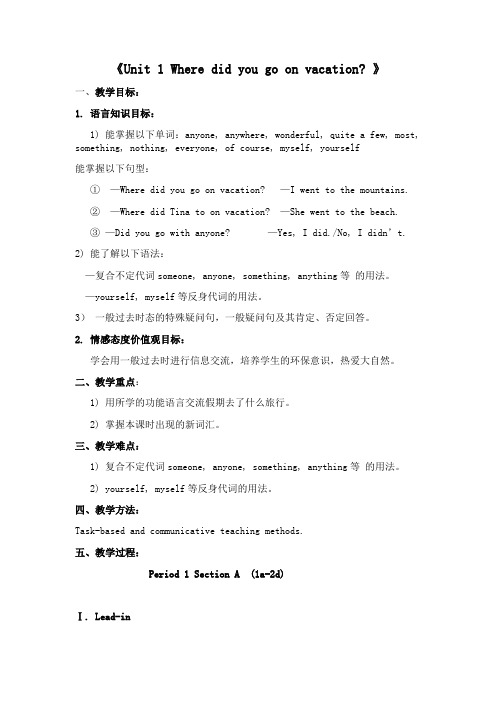
《Unit 1 Where did you go on vacation? 》一、教学目标:1. 语言知识目标:1) 能掌握以下单词:anyone, anywhere, wonderful, quite a few, most, something, nothing, everyone, of course, myself, yourself能掌握以下句型:①—Where did you go on vacation? —I went to the mountains.②—Where did Tina to on vacation? —She went to the beach.③—Did you go with anyone? —Yes, I did./No, I didn’t.2) 能了解以下语法:—复合不定代词someone, anyone, something, anything等的用法。
—yourself, myself等反身代词的用法。
3)一般过去时态的特殊疑问句,一般疑问句及其肯定、否定回答。
2. 情感态度价值观目标:学会用一般过去时进行信息交流,培养学生的环保意识,热爱大自然。
二、教学重点:1) 用所学的功能语言交流假期去了什么旅行。
2) 掌握本课时出现的新词汇。
三、教学难点:1) 复合不定代词someone, anyone, something, anything等的用法。
2) yourself, myself等反身代词的用法。
四、教学方法:Task-based and communicative teaching methods.五、教学过程:Period 1 Section A (1a-2d)Ⅰ. Lead-in1. 看动画片来进入本课时的主题谈论上周末做了些什么事情,谈论过去发生的事情。
Ⅱ. Presentation1. Show some pictures on the big screen. Let Ss read the expressions.2. Focus attention on the picture. Ask: What can you see? Say: Each picture showssomething a person did in the past. Name each activity and ask studentsto repeat:Stayed at home, Went to mountains, went to New York City 6. Went to the beach,visited my uncle, visited museums, went to summer camp3. Now, please match each phrase with one of the pictures next to the name of theactivity,point to the sample answer.4. Check the answers. Answers: 1. f 2. b 3. g 4. e5. c6. a7. dIII. Listening1. Point to the picture on the screen.Say: Look at the picture A. Where did Tina go on vacation? She went to mountains.Ask: What did the person do in each picture?2. Play the recording the first time.3. Play the recording a second time.Say: There are three conversations. The people talk about what did on vacation. Listen to the recording and write numbers of the names in the right boxes of the picture.4. Check the answers.IV.Pair work1. Point out the sample conversation. Ask two Ss to read the conversationto the class.2. Now work with a partner. Make your own conversation about the peoplein the picture.3. Ss work in pairs. As they talk, move around the classroom and give any help they need.4. Let some pairs act out their conversations.V. Listening1. Tell Ss they will hear a conversation about three students’conversations. Listen for the first time and fill in the chart. Then listen again and check Yes, or No.2. Let Ss read the phrases in the chart of 2b.3. Play the recording the first time. Ss listen and fill in the chart.4. Play the recording a second time for the Ss to check “Yes, I did.”or “No, I didn’t. ”5. Check the answers with the Ss.VI. Pair work1. Let two Ss read the conversation between Grace, Kevin and Julie.2. Let Ss work in pairs and try to role-play the conversation.3. Ask some pairs to act out their conversations.VII. Role-play1. First let Ss read the conversation and match the people and places they went.2. Let Ss act out the conversations in pairs.3. Some explanations in 2d.Homework:用英语询问你的一位好朋友,她(他)假期去了哪里?看到了什么?并将此对话写在作业上。
- 1、下载文档前请自行甄别文档内容的完整性,平台不提供额外的编辑、内容补充、找答案等附加服务。
- 2、"仅部分预览"的文档,不可在线预览部分如存在完整性等问题,可反馈申请退款(可完整预览的文档不适用该条件!)。
- 3、如文档侵犯您的权益,请联系客服反馈,我们会尽快为您处理(人工客服工作时间:9:00-18:30)。
Unit 1 Where did you go on vacation?学习目标:1、一般过去时态;2、谈论过去发生的事情(旅游经历);3、复合不定代词的用法;4、反身代词的用法;5、重点短语和句型:1)短语:go on vacation, stay at home, summer camp, go to the mountains, go to the beach,study for a test, go out quite a few, most of the time, buy sth for sb, go shopping, of course, feed sth to sb, nothing…but…, keep a diary, decide to do sth, try to do sth, feel like, in the past, enjoy doing sth, walk around, walk up to, start doing sth, wait for, too many, because of, the next day, forget to do sth, along the way, another two hours, at night, find out, so…that, keep doing sth, go on (doing sth), up and down, come up2)句型:◇-Where did you go on vacation? --I went to New York City.◇Did you go out with anyone?◇--How was the food?◇How did you like it?◇Still no one seemed to be bored.◇I wonder what life was like here in the past.◇What a difference a day makes!◇My legs were so tired that I wanted to stop.知识讲解:1、go on vacation 去度假2、stay at home 呆在家里3、summer camp 夏令营go to summer camp 参加夏令营4、go to the mountains 去爬山5、go to the beach 去海滩6、Did you go with anyone? 你和谁一起去的吗?复合不定代词:1)、构成:由some-, any-, no-, every- 与-thing, -body, -one, -where 等构成的词称复合不定代词。
如something, anything, nothing, everything, somebody, anybody, nobody, everybody, no one等。
2)、用法:◆复合不定代词作主语,谓语动词通常与单数一致。
如:Something is wrong with her bike. 她的自行车有毛病。
Everyone is here, no one is away. 每个人都在这儿,没有人缺席。
Nothing is difficult if you put your heart into it.世上无难事,只怕有心人。
◆修饰复合不定代词的词,只能放复合不定代词后,如:I have something important to tell you. 我有一些重要的事情告诉你。
Did you do anything interesting last week? 上周你做了一些有趣的事情吗?◆含some-, any-的复合不定代词,其用法与some, any一致(some用于陈述句,any用于疑问句和否定句),如:Is there anything (something) new in today’s newspaper? 今天报纸上有新的东西吗?I don’t have anything to do this evening. 今天晚上我没事可做。
◆-body/one指人,-thing指物。
Did you go with anyone? 你和谁一起去的吗?Are you going to buy anything? 你会去买东西吗?◆含-one和-body等指人的复合代词可有’s所有格形式,若后跟else时,所有格应加在else之后。
如:Is this anybody’s seat? 这儿有人坐吗?Can you remember someone else’s name? 你还记得其他人的姓名吗?◆含-one和-body等指人的复合代词,其代词常用the;含-thing等指事物的复合不定代词,其代词常用it。
如:Someone came in, but I didn’t kn ow who they were. 有人进来了,但我不知道是谁。
Something goes wrong, doesn’t it?出问题了,是吗?7、Central Park 中央公园8、anything special 一些特别的东西9、Did you meet anyone interesting? 你遇见过有趣的人吗?10、study for a test 为考试而学习study for an English test 为英语考试做准备11、go out 出去go out with sb 和某人一起出去12、Long time no see. 很久不见。
13、(be) on vacation 在度假14、Huangguoshu Waterfall 黄果树瀑布15、We took quite a few photos here. 我们在那儿拍了许多照。
quite a few 许多,修饰可数名词;quite a little 许多,修饰不可数名词。
如:There are quite a few vegetables and quite a little fruit. 这儿有许多蔬菜和水果。
16、Not really. 不见得,不完是。
17、I just stayed at home most of the time to read and relax. 我多数时间呆在家里读书放松。
most of the time 多数时间to read and relax 读书放松,不定式表目的。
18、no one, none, nobody区别:◆no one, 指人;不与of连用;作主语时谓语动词与单数一致;回答who引起的提问。
No one likes a person with bad manners. 没有人喜欢习惯不好的人。
-Who is in the room? -No one.◆none常与of 连用;指人或物;作主语时谓语动词用单数或复数;回答how many引起的提问。
如:None of us have/has a new bike. 我们中没有谁有新自行车。
-How many students are there in the room? -None.◆Nothing指物;作主语时谓语动词与单数一致;回答what引起的提问。
如:-What’s in the box? -Nothing.19、buy sth for sb = buy sb sth 为某人习某物20、No, I bought nothing. 不,我什么也没买。
nothing = not...anything, 如:I have nothing to tell you. = I don’t have anything to tell you.21、Everything tasted really good. 每样东西尝起来都不错。
taste 尝起来,连系动词,后接形容词作表语。
如:The soup tastes _____ , so it sells _____. 这汤尝起来很好,所以卖得很好。
A. well, wellB. good, goodC. good, wellD. well, good22、How did you like it? 你觉得它怎么样?= What did you think of it? 如:How do you like China? = What do you think of China? 你觉得中国怎么样?23、go shopping 去购物24、of course 当然,自然He was late again,of course. 自然他又迟到了。
Of course I’ll help you. 我当然会帮你。
25、but nothing for myself. 但为自己什么也没有(买)。
反身代词(oneself):1)构成:myself(我自己)、ourselves(我们自己);yourself(你自己)、yourselves(你们自己);himself(他自己)、herself(她自己)、itself(它自己)、themselves(他们自己)规则:一、二人称用“形容词性物主代词+self/selves”,三人称用“宾格+self/selves”;单数用self,复数用selves。
2)用法:◆主语发出的动作作用到主语本身,如:I teach myself English. 我自学英语。
He can dress himself now. 他会自己穿衣服了。
◆作主语或宾语的同位语,表强调,译着“亲自、本身、本人”等,紧放被修饰词后或句末。
如:The box itself is not heavy. 箱子本身并不重。
You must take care of yourself. 你必须照看好你自己。
◆用在某些固定短语中。
如:help oneself (to...) 随便吃,(吃些……吧)enjoy oneself 过得愉快learn ...by oneself 自学teach oneself 自学(all) by oneself 全靠自己,独自talk to oneself 自言自语26、feed sth to sb = feed sb with sth 喂某人某物feed on... 以……为食27、The only problem was that there was nothing much to do in the evening but read. 唯一的问题是,在晚上除了读书就没什么事可做。
